

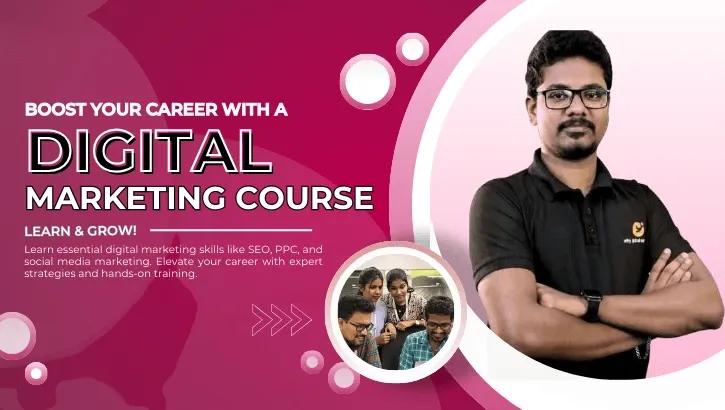
In this rapidly changing digital environment, online marketing strategies have become imperative to be competitive. Digital Marketing Course imparts skills which are essential for analyzing online consumer behavior, executing marketing strategies, and analyzing digital trend information. Pursuing a Digital Marketing Course will definitely be a terrific chance for those aspiring marketers, entrepreneurs, or business owners.
The blog examines the concepts, techniques, and actual skills imparted in a Digital Marketing course that makes a vibrant contribution to achieving success in today's business landscape.
Digital or online marketing includes an entire array of online works which creates awareness among target audiences, communicates with them while inducing an urge to make purchases. Digital Marketing Course assists in imparting detailed knowledge of assorted marketing channels that are designed exclusively to reach people targeted.
Key Areas Of Study:
Basics Of Digital Marketing - Study how online marketing differs from traditional marketing.
Consumer Behavior Investigation - Learn to interpret customer insights and trends.
Marketing Tools & Platforms - Practical exposure to Google Ads, Facebook Ads, or email automation software.
| Digital Marketing Topic | Key Focus Areas |
|---|---|
| SEO | Keyword Research, On-page & Off-page SEO, Technical SEO |
| PPC Advertising | Google Ads, Bidding Strategies, Landing Pages |
| Social Media | Organic & Paid Strategies, Audience Engagement |
| Email Marketing | List Building, Automation, Campaign Analysis |
| Content Marketing | Blogging, Video Content, Strategy Planning |
| Analytics | Google Analytics, Data Interpretation, KPI Tracking |
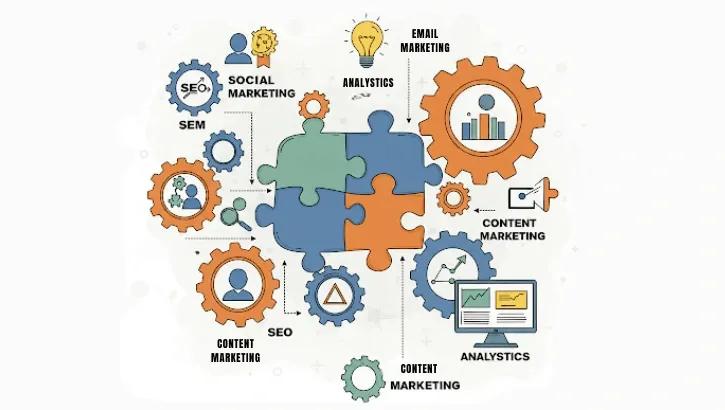
The starting block of your knowledge in other aspects will be the understanding of the true essence of digital marketing-a conceptual core around which all the others are equal.
What is Digital Marketing?
Learn about the term and its implications; and learn how digital marketing has changed the way things were done in the traditional world of business. Online marketing is in one broad category, which includes content marketing, email marketing, and more.
The Marketing Funnel
Awareness, Interest, Decision, and Action-the key marketing funnel. You will learn how various digital tools target each critical stage of the funnel to convert leads into customers.
Reading Metrics and KPIs
Understand how to read the data collected for measurement of success for the campaigns. It is meant to enhance the results through the enhancements of utilizations into strategies.
SEO is one of the most important ways for optimizing a website to improve visibility on a search engine engine, which could be Google, Bing, or Yahoo. A business ranking on page one of a Search Engine's results will experience a higher traffic volume while enjoying increased exposure and sales.
Keyword Research and Optimization: Research on the right keywords correlating user search intent.
On-Page SEO Techniques: Meta titles, meta descriptions, headers, and content optimization for better rankings.
Off-Page SEO and Link Building: Backlinking measures in the field of creating high-quality links in the eyes of potential clients in order to legitimize your business.

2. PPC Advertising: Generating Immediate Traffic
PPC advertising offers businesses the unique opportunity to display paid ads to search engines, social media, and other digital channels. Unlike SEO, which takes time to show results, PPC provides immediate visibility.
Google ads and search engine marketing: Setting up and managing ad campaigns in Google.
Social media advertising campaign: Running paid campaigns in Facebook, Instagram, LinkedIn, and Twitter.
Bid Strategies and Budget Management: Ad budget allocation maximizing returns on/investment (ROI).
Retargeting and Remarketing: Targeting again some of the previous visitors to improve the probability of conversions.
Performance Tracking and Optimization: Conducting performance analysis of ads and driving changes for optimization based on data.
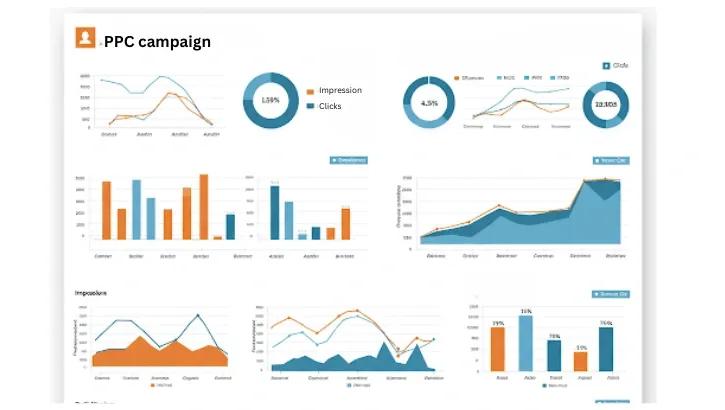
Social media consists of Facebook, Instagram, LinkedIn, Twitter, and TikTok-all vitally tied to brand building and audience engagement. Companies utilize it to communicate their image, get involved with their customers, and sometimes even use it as a sale funnel, thus generating traffic to their business websites.
Development Strategies for Social Media: Creating viable marketing frameworks intersected by a keen sense of audience insight.
Content Building and Scheduling: Crafting attractive posts, videos, and stories to get the audience engaged.
Influencer Marketing Strategy: Concerning collaboration with influencers that work towards generating further reach for the brand.
Social Media advertising: Target ads on Facebook, Instagram, LinkedIn, and Twitter.
Community management: Engaging followers, answering questions, and reputation management.
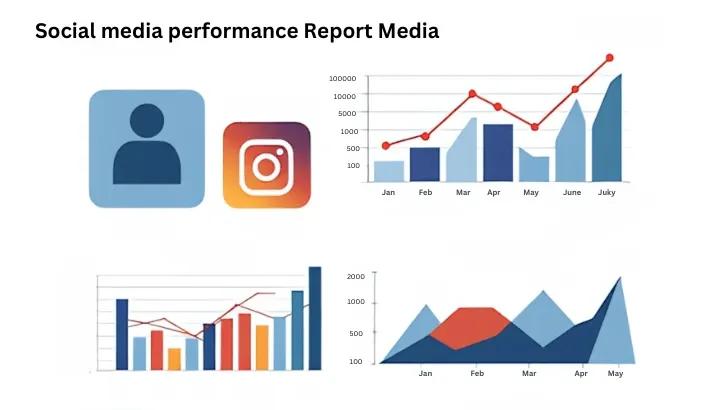
Email marketing has been one of the unbeaten modes of digital marketing to where businesses maintain relations with clients, attract another visit through retention, and assure their return.
Email List Building Strategies: Growing a comprehensive database where readers find courage.
Segregation and Personalization: Use the preferences of your user or by segment to send emails that are in particular targeted.
Automated email campaigns: Setting workflows regarding welcome emails, cart recovery emails, follow-ups, etc.
Email copywriting and designing: write value-packed subject lines and engaging content.
Performance analysis: Track open rates, clicks, conversions.
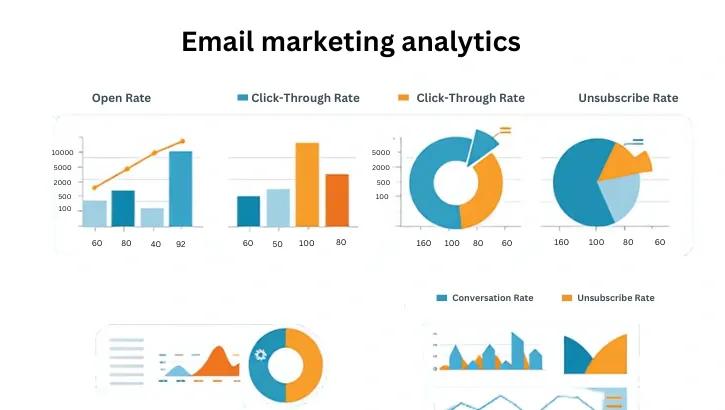
Content marketing is the art and science of developing, distributing and popularizing significant content to get and keep people as customers.
Content Strategy Development: Planning one's content tailored according to audience interests and business outcome.
Blog Writing SEO Optimization: Combining all possible keywords in the form of articles to improve traffic flow through your website.
Video Marketing: Storyboarding to engage the audience better.
Content Distribution Strategies: Use of one's own sites like blogs, social media pages, and newsletters in order to target a wider audience.
User-Generated Content: Testimonials, reviews, and experiences from such consumers.
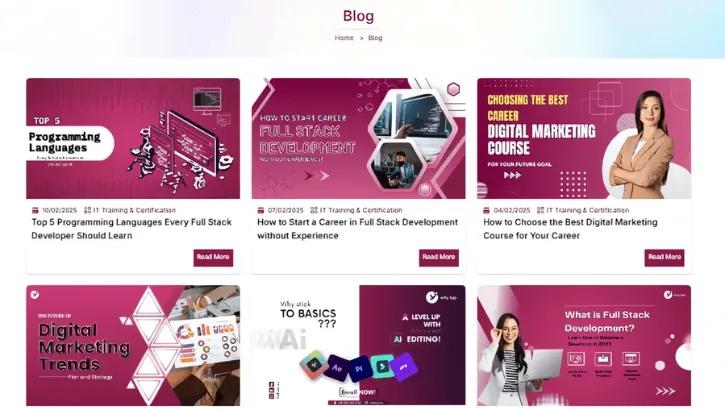
Measure and optimize the performance of digital marketing on a continuous basis. Web analytics points out ways toward improvement by the behavior of users, the efficiency of campaigns, and the scope to improve further.
Set up and use Google Analytics: Track site traffic, audience demographics, and behavior.
Conversion Rate Optimization [CRO]: Improving user experience to maximize sales and/or sign-ups.
A/B Testing Approaches: Testing a different version of content to make the support of marketing for improvement effective.
Data Interpretation and Reporting: Using analytical tools to generate insights infusing decisions at a strategic level.
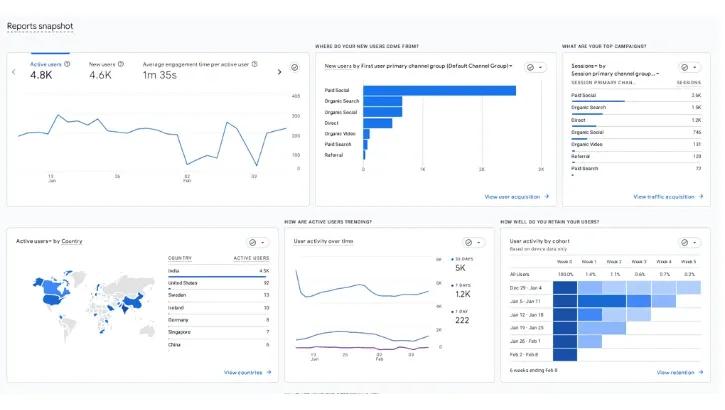
Affiliate marketing is a straightforward way of making many commissions by digital marketing for the boost of product or service sells.
Choosing an Appropriate Affiliate Program: Picking out the right affiliate networks to be able to earn maximum commissions.
Content-Based Affiliate Marketing: Creating a series of blog posts, videos, and guides that drive conversions.
Tracking and Performance Optimization: How to measure affiliate sales and ways to improve promotion.
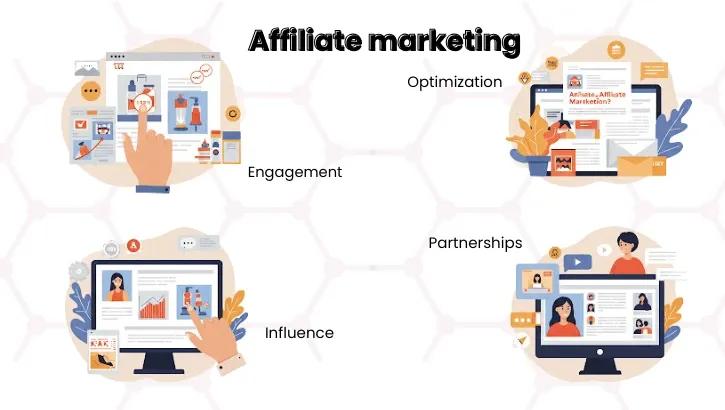
Digital marketing as a field never sits still. The digital marketing course also covers emerging the digital marketing trends and keeps learners a step ahead in the evolving arena of the industry.
Marketing Aspect of AI: Chatbots that use artificial intelligence, predictive analytic tools, process automation, and everything else that deploys AI.
Voice Search Optimization: Adapting SEO content to voice searches via browsers, such as for the Google Assistant and others.
Video and Live Streaming: Making use of growth opportunities laid by YouTube, Instagram live, and TikTok for live interaction.
Targeted Marketing: Delivering personalized content and offers according to user behavior.
Blockchain Technology and Data Privacy: Knowing how blockchain technology aids in providing transparency in digital marketing.
In this digital era, online marketing is a must for any business or individual. WHY tap Digital Marketing Course in Chennai offers practical teaching of SEO, PPC Programs, Social Media Marketing, Content Marketing, etc.
The course provides an extremely exhaustive detail into skills that learners need for traffic creation into the websites, enhancing brand visibility, and more importantly, lead generation. The bulk of training caters to practical work; students are working from day one in campaign management, web analytics, and conversion optimization. Achieving higher ranks on Google and an ad campaign generation are all the major aspects of this syllabus catered to the needs of entrepreneurs, job seekers, and business owners.
The Digital Marketing Course in Chennai with WHY tap gives you the opportunity to train with industry experts, earn an industry-recognized qualification, and create pathways for career advancement. The course imparts relevant skills and knowledge to either elevate your business to the next level or commence a journey in digital marketing. Choose WHY tap now! Make a success of your first step!